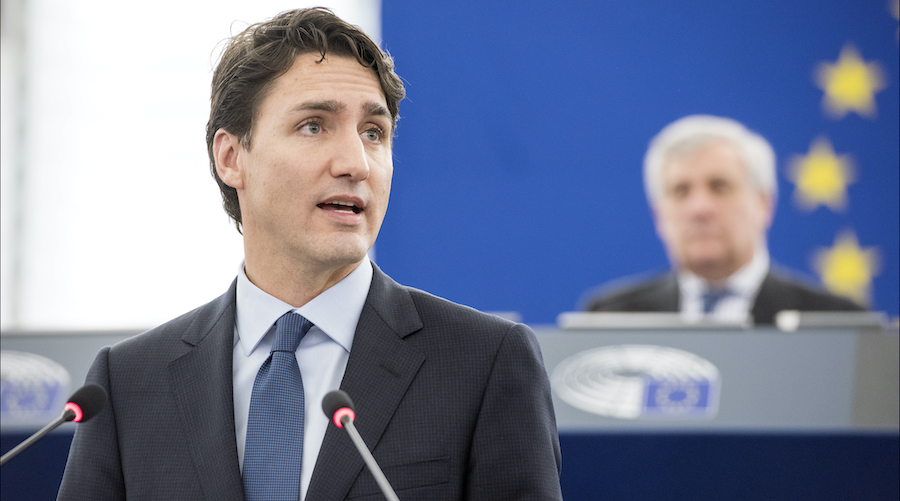
Canada will impose new tariffs on Chinese-made electric vehicles, aluminum and steel, lining up behind western allies and taking steps to protect domestic manufacturers.
The government plans to announce a 100% levy on electric cars and 25% on steel and aluminum, according to people familiar with the matter, speaking on condition they not be identified because the matter is still private. Prime Minister Justin Trudeau is expected to unveil the policy in Halifax, Nova Scotia, where he’s gathered with the rest of his cabinet for a series of meetings about the economy and foreign relations.
Canada, an export-driven economy that relies heavily on trade with the US, has been closely watching moves by the Biden administration to erect a much higher tariff wall against Chinese EVs, batteries, solar cells, steel and other products. Canada’s auto sector is heavily integrated with that of its closest neighbor: The vast majority of its light vehicle production — which was 1.5 million units last year — is exported to the US.
Finance Minister Chrystia Freeland, the most powerful person in Trudeau’s cabinet, has been one of the most prominent voices in favor of a harder approach to Chinese vehicle exports, and becoming a closer trade ally with the US.
In June, she announced a public consultation on possible measures to make it more difficult for Chinese companies to sell electric vehicles in the Canadian market. The auto industry, she said, is “facing unfair competition from China’s intentional, state-directed policy of overcapacity that is undermining Canada’s EV sector’s ability to compete.”
In July, Freeland went further. During an interview with Bloomberg News, she said the tariffs consultation might go beyond electric cars.
“Geopolitics and geoeconomics is back,” she said at the time. “That means that Western countries— and very much the US — is putting a premium on secure supply chains and is taking a different attitude towards Chinese overcapacity.”
The European Union has also announced proposed new tariffs on electric vehicles important from China, though at lower levels than the US and now Canada are proposing.
Products made by SAIC Motor Corp. face additional duties of 36.3%, while Geely Automobile Holdings Ltd. and BYD Co. each face tariffs of 19.3% and 17%, respectively, according to a draft decision released last week. Tesla Inc. will see an extra 9% charge on Chinese-made vehicles.
Chinese leaders plan to raise the issue of tariffs when US National Security Adviser Jake Sullivan visits this week, according to the official Xinhua News Agency. Sullivan is due to meet with Foreign Minister Wang Yi and may also meet with Chinese leader Xi Jinping.
China has retaliated against Canada before. It previously restricted imports of Canadian canola seed for three years — a move seen as retribution for a decision by Canada authorities to arrest Huawei executive Meng Wanzhou in Vancouver on a US extradition warrant. Meng returned to China in 2021.
The value of Chinese electric vehicles imported by Canada surged to C$2.2 billion ($1.6 billion) last year, from less than C$100 million in 2022, according to data from Statistics Canada. The number of cars arriving from China at the port of Vancouver jumped after Tesla Inc. started shipping Model Y vehicles there from its Shanghai factory.
However, the Canadian government’s main concern isn’t Tesla, but the prospect of cheap cars made by Chinese automakers eventually becoming available. BYD informed the Canadian government in July that it intends to lobby lawmakers and officials about its plans to enter the country.
Trudeau also faced political and industry pressure. The Canadian auto sector had been pushing him to hike tariffs to protect domestic jobs and wages, arguing that China’s EVs are cheaper due to much weaker labor standards. The government has also bet big on automakers and manufacturers from democratic allies: the government has agreed to to multibillion-dollar subsidies for electric vehicle plants or battery factories for Stellantis NV, Volkswagen AG and Honda Motor Co., among others.
Steel and aluminum producers in Canada have also publicly and repeatedly urged the government to restrict China’s access, saying that Xi’s industrial policy allows the Asian powerhouse to unfairly flood foreign markets, putting local jobs at risk.
“China does not play by the rules,” Catherine Cobden, president and chief executive officer of the Canadian Steel Producers Association, told reporters earlier this month. “Government should be under no illusion that they do.”
(By Brian Platt)
Comments